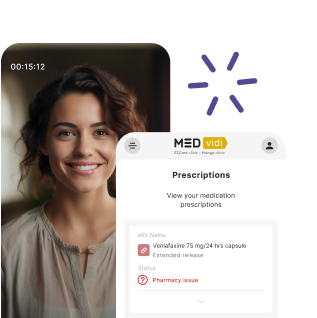Highlights
- Insomnia is a common side effect of Lexapro (escitalopram), including difficulty falling asleep, staying asleep, or a tendency to wake up too early.
- Lexapro-induced insomnia can affect sleep quality and lead to reduced focus, fatigue, and irritability.
- To minimize insomnia from Lexapro, consider taking the medication in the morning, maintaining good sleep hygiene, and avoiding caffeine and alcohol before bedtime.
- If you’re experiencing persistent insomnia while taking Lexapro, discuss this with your healthcare provider.
People who experience clinical depression and anxiety often get prescribed Lexapro (escitalopram) as it can treat both conditions. But like many other prescription medications, it has some side effects. One such common side effect is insomnia, when individuals complain Lexapro keeps them up at night by making it difficult to fall asleep or stay asleep.
Let’s learn more about Lexapro and the sleep issues it can cause and explore how you can manage this adverse effect.
Get help for insomnia online

What Is Lexapro? A brief overview
Lexapro, containing the active ingredient escitalopram, is commonly prescribed to treat depression and anxiety. It belongs to an antidepressant class called selective serotonin reuptake inhibitors (SSRIs). It was approved by the U.S. Food and Drug Administration (FDA) in 2002 and has since gained popularity due to its efficacy and relatively mild side effects compared to other antidepressants.
How Does Lexapro Work in the Brain?
Lexapro affects certain regions of the brain to keep a balance of serotonin levels. Serotonin is a crucial brain chemical responsible for maintaining mood and behaviors. It works by
The response to the medication can vary, and it may take several weeks to experience the full therapeutic effects of Lexapro.
What Does Lexapro Treat?
Lexapro is FDA-approved to be prescribed for the following mental health issues:
- Major depressive disorder (
MDD[2] ) - Generalized anxiety disorder (
GAD[3] )
It is also prescribed off-label for the following mental health issues:
What Is the Best Time to Take Lexapro for Anxiety?
Some people find out that the best time to take Lexapro to avoid insomnia is generally in the morning. Taking it earlier in the day gives the body time to break down the medication, so its concentration and effects on your brain decline by evening. This schedule reduces the likelihood of it interfering with sleep at night.
However, individual responses to Lexapro can vary (some patients can feel drowsy), so it may take some trial and error to find the best time that works for you. Some people might find it better to take it in the afternoon or at a different time, depending on their unique experiences. If you have trouble sleeping after starting Lexapro, consult your healthcare provider to determine the ideal schedule, ensuring avoidance of sleep difficulties and maintaining the medication’s effectiveness.
To ensure consistency of treatment, it’s important to take it at the same time every day. This helps maintain a stable level of the medication in your system, which helps achieve therapeutic effects and reduces the risk of side effects.
Lexapro Dosage
The starting dose of Lexapro is typically 10 mg taken once a day, either in the morning or the evening. In most cases, 10 mg serves as both the maintenance and recommended dose for continued treatment. The doctor may decide to increase the dose to a maximum of 20 mg, depending on your response to medication and if it’s deemed necessary. Remember to not change the dosage without consulting your healthcare provider.
Warnings and Precautions
While Lexapro can be effective in treating major depression and anxiety symptoms, there are a few important warnings and precautions that you should be aware of before using it and discuss with your clinician:
- Suicidal Thoughts: Lexapro may increase the risk of suicidal thoughts and behaviors, especially during the initial weeks of treatment or during dose adjustments. It’s essential to closely monitor for signs of worsening depression or unusual behavior changes.
- Withdrawal Symptoms: Abrupt discontinuation of Lexapro can lead to
discontinuation syndrome[8] and withdrawal symptoms, including dizziness, irritability, nausea, headache, and mood swings. Gradual tapering off the medication supervised by a healthcare provider is recommended. - Serotonin Syndrome: Since escitalopram is a selective serotonin reuptake inhibitor, its combination with other serotonergic medications can lead to serotonin syndrome, a potentially life-threatening condition caused by excessive serotonin in the brain. Symptoms include agitation, hallucinations, rapid heartbeat, muscle stiffness, shivering, and sweating. Immediately seek medical attention if you suspect serotonin syndrome.
- Drug Interactions: Lexapro can interact with many other medications, leading to potentially dangerous consequences. These interactions can increase the risk of side effects or reduce the effectiveness of treatment. Always inform your healthcare provider about all medications you are taking.
- Allergic Reactions: Individuals allergic to escitalopram or any other ingredients of Lexapro should avoid using it.
- Activation of Mania or Hypomania: Lexapro can trigger manic or hypomanic episodes in individuals with bipolar disorder, so screening is crucial.
- Interaction With Medical Conditions: Individuals with heart disease, kidney disease, liver disease, epilepsy, or a history of seizures, should use escitalopram with caution or may need dose adjustment
- Pregnancy and Breastfeeding: Lexapro should be used with caution during pregnancy and breastfeeding as it may pose risks to the baby. Discuss the potential risks and benefits with your healthcare provider.
Side Effects of Lexapro
Although it is considered a well-tolerated medication compared to other options, the long-term use and higher doses of Lexapro may cause some side effects. The common Lexapro side effects are the following:
- Sleep disturbances
- Nausea
- Weight gain
- Abnormal muscle movements
- Growth changes
- Heavy menstrual periods
- Pain in urination
- Erectile dysfunction
- Constipation
- Sweating
- Shaking
- Loss of appetite
- Infections
- Dizziness
- Weakness
- Anxiety
- Dry mouth
Effects of Lexapro-induced Insomnia
Whether it’s used to treat depressive disorders or anxiety, Lexapro can cause insomnia as a side effect. Patients may note difficulties in falling asleep, staying asleep, or wake up too early without being able to fall asleep again. People who experience insomnia often report poor subjective sleep quality and daytime fatigue, which can negatively affect their day-to-day functioning and overall quality of life because of increased stress and irritability.
Other consequences of sleep disturbances include difficulty maintaining focus, decreased energy, and emotional instability throughout the day. Therefore, if you’re taking Lexapro and experiencing poor sleep quality or other insomnia symptoms, it’s crucial to see a clinician and address the issue promptly.
Incidence of Insomnia With Lexapro
Insomnia is a relatively common side effect of using Lexapro for anxiety disorders and depression. However, sleep issues can be a symptom of the condition being treated. This makes it difficult to discern whether the sleeplessness is being caused by the medication or is a residual effect of the underlying mental health issue.
A systematic review of
How Long Does Lexapro Insomnia Last?
Patients usually have trouble sleeping during the first week of treatment even if they are tired or fatigued. Some people become able to sleep with time, but they face difficulties in staying asleep for average durations. Typically, these sleep issues can last from a few days to a few weeks. However, the exact duration can vary depending on individual factors such as dosage, personal response to the medication, and overall health.
Does Lexapro Insomnia Go Away?
It might take up to a few weeks to lower the impact of Lexapro on your sleep as the body adjusts to the medication. With time, you may notice a marked improvement in the sleep cycle. However, if the insomnia does not subside even after several weeks, or significantly starts to impact your quality of life, talk to your healthcare professional to learn how to deal with it.
Treatment of Insomnia
Insomnia can have debilitating effects on a person’s daily life and can exaggerate anxiety and depression symptoms. You can employ various approaches to improve sleep quality and get rid of insomnia caused by Lexapro. Commonly, a treatment plan includes a combination of behavioral therapy and self-help strategies best formulated by a mental health professional.
When to Consult a Doctor for Lexapro-Induced Insomnia?
If you’re experiencing insomnia as a side effect of taking escitalopram, and it doesn’t resolve over time but persists for more than a few weeks, it is a major sign to consult with your healthcare provider. More specific symptoms include struggling with concentration, mood swings, or excessive fatigue
Chronic insomnia can disrupt your personal or professional life, leading to absenteeism, poor performance, or strained relationships. Severe sleep problems can also lead to other health issues.
If you’ve tried common self-help tips to improve your sleep but they failed to help, it is also best advised to see a doctor. A healthcare professional can best determine the root cause of your insomnia by assessing your treatment plan, and then adjust your Lexapro dosage or recommend other medications or therapies to manage insomnia.
Strategies to Manage Lexapro Insomnia
Although the best treatment is only possible by getting professional help from a medical professional, there are still some ways to help manage the symptoms:
- Switching to Other Antidepressants: Discuss with your healthcare provider the possibility of switching to a different antidepressant better suited for you. Some medications in the same class (SSRIs) may have different side effect profiles.
- Sleep Supplements: Certain supplements used under medical supervision might help you manage insomnia as a short-term solution.
- Psychotherapy: Cognitive-behavioral therapy for insomnia (
CBT-I[10] ) helps identify and change thoughts and behaviors that affect sleep. It can be an effective treatment for insomnia with or without the use of medication. - Avoid Long Naps: Avoid napping for too long or too late during the day as it can disrupt your sleep-wake cycle and make it harder for you to fall asleep at night.
- Practice Good Sleep Hygiene: Establish a habit of going to bed and waking up at the same time daily, including weekends. Also, limit screen time before bed, and make sure you have a comfortable, dark, and quiet sleep environment.
- Have a Sleep Routine: Develop a calming sleep routine including activities like reading, gentle yoga, meditation, or taking a warm bath, that helps signal your body that it’s time to sleep.
- Eat a Healthy Diet: Eating a balanced diet throughout the day can contribute to better sleep. Avoid heavy and spicy meals close to bedtime as these can cause discomfort and indigestion, disrupting sleep.
- Relaxation Techniques: Progressive muscle relaxation, deep breathing, mindfulness meditation, or guided imagery can help calm the mind before bed.
- Avoid alcohol consumption: Lexapro and alcohol combined can increase the sedative effect, but alcohol can disrupt sleep leading to fragmented sleep in the long run.
- Take Medication in the Morning: Taking escitalopram early allows the medication to be processed throughout the day lessening the insomniac effect till midnight.
- Avoid Caffeinated Drinks: Coffee and other caffeinated beverages have stimulant effects which can disrupt sleep and may prevent falling asleep. So, it’s recommended to limit their intake, especially in the afternoon and evening.
- Exercise Regularly: Optimal levels of consistent physical activity during the day can promote better sleep quality.
- Avoid Distractions: Keep your cell phones, laptops, and other technological devices away to avoid distractions close to bedtime. If you live in a noisy environment, consider using earplugs or a white noise machine.
Conclusion
While Lexapro is effective for treating depression and anxiety, it can cause insomnia in some people. These sleep problems usually subside over time and can be tackled with the help of a healthcare professional if they become prolonged or severe.
FAQ
How long does it take for Lexapro to help you sleep?
What sleep aid can I take with Lexapro?
How to deal with insomnia while on Lexapro?
You can deal with insomnia by incorporating good sleep hygiene practices into your routine. These include maintaining a consistent sleep-wake schedule, avoiding caffeine and screens close to bedtime, and creating a low-light, comfortable environment. You can also start exercising for 15-20 minutes daily, but not in the late evening. Relaxation activities before bed, such as reading, meditation, deep breathing, or gentle yoga, can help calm your mind and body. If self-help methods don’t work, it’s essential to consult with your healthcare provider.
How to treat insomnia while on Lexapro?
Why do antidepressants cause insomnia?
Many













